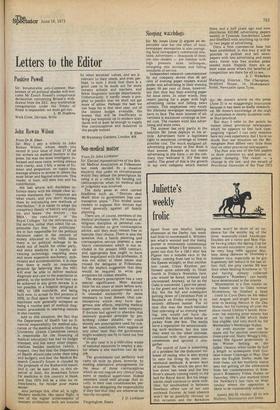Sleeping watchdogs
Sir: Mr Jones (June 2) argues an impeccable case but the effect of local newspaper monopolies is also corrupting local newspaper's commercial relations. Advertisers — thousands of them. are also readers — are familiar with' high pressure sales techniques,.' swingeing rate increases and falling: standards of service.
Independent research commissioned by my company shows that 46 per cent of evening paper readers would prefer less advertising in their evening, paper; 60 per cent of them, however, say that they buy their evening paper for local news. In other words, they resent paying for a paper with high advertising ratios and falling news content. This emphasises very nicely the dilemma newspaper managements have to face. The main interest of advertisers is maximum coverage at lowest cost. The readers want less advertising and more news.
The answer lies only partly in the solution Mr Jones deploys in his article. Advertisers have a legitimate right to maximum coverage at lowest possible cost. The much maligned alladvertising give-away or free sheet is their answer. Readers do not resent advertising in this form — on the contrary they welcome it. It's free and useful. The proof of this is the growth in my own company which started three and a half years ago and now distributes 833,000 advertising papers weekly in Tyneside, Sunderland, Leeds and Sheffield with anything up to thirty-two pages of advertising.
Once a firm commercial base has been established, in this way it will be possible to publish and sell newspapers with less advertising and more news. Never was free market press needed more. Happily there are at least some areas where the benefits of competition are there for all to see.
A. C. Wakeham Marketing Director, The Champion, Stratford House, 14 Shakespeare Street, Newcastle upon Tyne.
Sir: Mr Jones's article on the press (June 2) is so staggeringly inaccurate because it has been so badly researched. Mr Jones's knowledge of the craft of journalism is clearly academic rather than practical.
But may 1 refer to the points he makes about provincial newspapers which he appears to feel lack campaigning vigour? I can only mention here my own experience, but I have no doubt that our situation on the Birmingham Post differs very little from that on other provincial newspapers.
The Post was one of the first papers to draw attention to, and protest at, poison dumping. The result — a change in the law, and the award of Provincial Journalist of the Year 1972


































 Previous page
Previous page